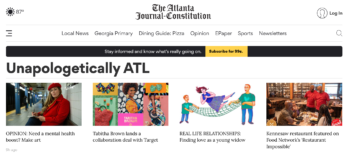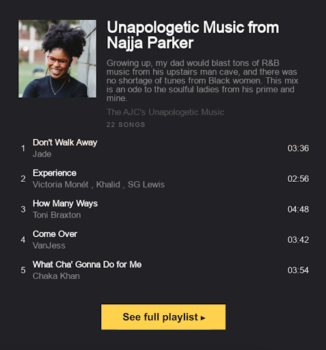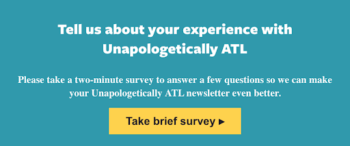How The Atlanta Journal-Constitution is reaching Black audiences through its Unapologetically ATL newsletter
Najja Parker, Angel Brooks, Shawn McIntosh, Holley Hughes, Meghan Claar and Leigha Hubbard, The Atlanta Journal-Constitution,This is a series on Better News to a) showcase innovative/experimental ideas that emerge from the Knight-Lenfest Newsroom Initiative and b) share replicable tactics that benefit the news industry as a whole. This “win” comes from The Atlanta Journal-Constitution, which participated in the Major Market Table Stakes program in 2021 and the UNC-Knight Table Stakes program in 2019-20. The team included Najja Parker, newsletter coach; Angel Brooks, senior editor of digital audience and engagement; Shawn McIntosh, managing editor; Holley Hughes, technical product manager; Leigha Hubbard, director of analytics and research; and Meghan Claar, multimedia sales manager.
You can also hear all about it on the It’s All Journalism podcast.
Question: What communities do you serve and what can you tell us about the history of your organization?
Answer: The Atlanta Journal-Constitution is owned by Cox Enterprises, a private, family owned, diversified and global company that grew from newspaper roots. It has been in Atlanta since 1939.
Our coverage area for print circulation is mostly focused on the Atlanta metro area’s core counties, but we also cover state government and issues of statewide importance. Our digital editions, AJC.com and the E-paper, have broad state readership.
We serve a diverse and growing “swing” state that plays an outsized role in our nation’s politics, culture and future. Georgia has 10.7 million residents, 57 percent in metro Atlanta. The state is about half white, a third black and the remainder Hispanic, Asian or mixed race ethnicity. Metro Atlanta is more racially and ethnically diverse and younger than the state overall and the diversity of the area is expanding quickly.
Our key topics include investigative and accountability reporting; state, local and national politics; state government news to serve an abundance of state employees who live in the metro area; pro and college sports; and passions like food/dining and Atlanta’s outdoor and entertainment attractions. We are home to the world’s busiest airport and a new “Beltline” rail trail that encircles the city with vibrant neighborhoods and Atlanta’s trademark treescape.
Q: What problem were you trying to solve, and why was solving the problem strategically important for your organization?
A: Atlanta is synonymous with Black culture thanks to the Black community’s major contributions to civil rights and entertainment. However, the Black community has been underrepresented among our readers, in print and digital, based on past readership studies.
We wanted to create a brand that addressed the gaps in our readership and coverage by introducing Unapologetically ATL, a free, weekly newsletter that highlights Black culture, events, news and trends in metro Atlanta. We launched the newsletter in September 2021.

A screenshot showing Unapologetically ATL stories.
It’s been our mission to improve AJC brand recognition among Black readers in metro Atlanta by amplifying stories that focus on the Black community.
Q: How is this approach related to Table Stakes (e.g. one of the 7 Table Stakes and/or an outgrowth of the Knight-Lenfest initiative, etc.)?
A: This approach is related to Table Stake No. 1 (“Serve targeted audiences with targeted content.”)
Specifically, we identified and focused on a particular target audience with needs, interests and problems that we could address well. When the newsletter team took a step back to evaluate our current newsletter portfolio and paired it with our challenge statement of reaching new audiences, we realized a major and frankly embarrassing blindspot — a focus on Black voices.
Q: How did you go about solving the problem? Were there things you stopped doing?
A: Our journalists are eager to share content with Black readers who might be unfamiliar with our brand, so we first leaned on our reporters already covering Black culture in Atlanta. We designated two hosts for the newsletter, Ernie Suggs, our race and culture reporter, and Nedra Rhone, our lifestyle columnist.
We collaborated with our co-hosts to create an editorial calendar full of content ideas and later teamed up with our senior designer Jason Newman to build out the look and feel of the newsletter. We ended up with six sections: one main story to read fully in the newsletter, two complimentary news links, an indulgence of the week, a photo and video of the week, and a Spotify playlist.
We determined that Unapologetically ATL would be an introductory product, a newsletter targeted to readers at the top of our audience funnel. That’s why we experimented with a “low-link” newsletter, which provides readers one main story they can consume fully, without having to log in or click in to read. We were intentional about including as few links as possible, so new AJC audiences would not run into paywalls during their first interactions with our brand.
We also wanted to make sure we simplified our sign-up process for new users. We added inline sign-ups on the site, which appear on articles related to content in the newsletter, to encourage subscribers to sign up with just their email as opposed to creating an account at our site and logging in before subscribing. Additionally, we created a specific link for easy sign-ups that we pointed social media efforts toward: https://www.ajc.com/unapologetically-atl/.
We promoted the newsletter on Instagram, Facebook and Twitter. We also used paid social media to help us target Black audiences. We encouraged coworkers to share the easy sign-up link across their networks, particularly tagging HBCUs’ social media accounts, as well. We also published a story and teaser video on our website to introduce Unapologetically ATL and its hosts.
Q: In what ways is the Unapologetically ATL newsletter different from other newsletters you publish?
A: Unapologetically ATL is our most interactive and collaborative newsletter.
While Unapologetically ATL has two co-hosts that readers primarily hear from, we have invited all of our Black journalists from the newsroom to participate in the multiple sections of the newsletter.
For example, the Spotify playlist is curated by a different journalist each week and so is “On Tap,” a section where journalists can share their favorite books, TV shows or things to do around the city.
The goal is to help split the workload and add voice and personality to the newsletter in a variety of ways. It also helps that our reporters have been eager to contribute, because they are passionate about the content.
Lastly, we have weekly meetings with our co-hosts and editors where we review our editorial calendar, which has content planned out for the next several weeks. We remain flexible to make room for any timely hot topics we may want to include.

A screenshot of a playlist curated by Najja Parker.
Q: What worked?
A: This easy sign-up link was an incredible win for us. Initially, our sign-up process was pretty wonky, with too many steps for users to complete before successfully signing up for a newsletter or other AJC product.
Thanks to the easy sign-up link, we reached more than 1,000 subscribers by the end of launch week. It had a domino effect, because we also began creating easy sign-up links for other newsletters.
As of May 2022, Unapologetically ATL has about 5,000 subscribers with a 38.1% unique open rate. We are particularly paying attention to open rates, because the newsletter is an introductory product designed to include few links so it can be fully consumed within the email. Therefore, click rates are less essential right now.
The newsletter has sparked healthy conversations about race, culture and identity. We understand that Black Atlantans are not a monolithic group. The Black community has a shared history, but the lived experience can be very different. We are having more discussions about what it means to be Unapologetically ATL, so we can deliver original and curated content that consistently fits the definition of Unapologetically ATL. As we return to the office for in-person work, there are opportunities to help educate ourselves and others across our staff. We could potentially host a Lunch n’ Learn or Q&A for those interested in learning more about our content and strategy.

The Unapologetically ATL newsletter makes it very simple for readers to sign up with just their email address.
Q: What effect has this newsletter had on reaching new audiences?
A: About 30% of all new AJC.com users have entered the audience funnel as a result of signing up for Unapologetically ATL, which is another huge win for us. We also recently included a survey in the newsletter to learn more about our audiences’ interests and backgrounds. We’ll be using the data to improve the newsletter’s content and determine whether we’re reaching the new audiences we intended.

Readers are asked to give feedback on the Unapologetically ATL newsletter.
Q: How did you collaborate with an influencer and what did you learn from that?
A: Our journalists are fully embedded in our communities, so when the PR team of Desi Banks, a local influencer with more than 7 million followers on Instagram, reached out to collaborate with the AJC, Unapologetically ATL was top of mind.
We included a feature article of Banks in the newsletter and also produced a video to share across social media. We provided the video and easy sign-up link to Banks to share across his social media channels. When we promoted the story online, we made sure to tag Banks, who re-shared our posts on his accounts.
View this post on Instagram
We learned the value of collaborating with local creatives and with the very audiences we want to target. We’d like to continue exploring partnerships with influencers and organizations to form partnerships that are mutually beneficial.
Q: What would you do differently now?
A: We wish we had started much earlier.
Our focus on suburban readers over the years left some communities, including many in central Atlanta, feeling like the paper was not “for them.” We spent so many years trying to retain print suburban readers that we lost some focus on what makes Atlanta special, including robustly covering the city’s global influence on music, film, the arts and culture.
We also wish we had been able to secure paid promotion earlier in the process. It might have also been helpful to host a virtual Q&A with the newsroom about the whole Table Stakes process (including both teams) to share more of what we were doing.
Q: How do you see the Unapologetically ATL brand growing and what could other news organizations learn from this?
A: We’d love to create a brand for Unapologetically ATL. In addition to the newsletter, we are considering a podcast and Instagram page to help push the company forward and reach even more audiences. AJC recently hired an executive producer of events as well that is developing a newsletter community engagement plan and brainstorming virtual and in-person events.